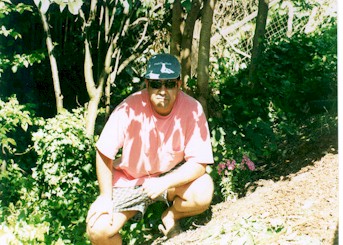Pahlavan Mahmud

Pahlavan Mahmud -- furrier by profession, prizefighter by destiny, poet by skill, Sufi by inclination and philosopher by legacy -- was born in ancient Gurganj (Urgench/Khiva) in 1247.
Especially strong and nimble, he took part in wrestling championships not only across Khwarezm but also in Iran and India. A practicing Sufi auliya, he was called the 'Pahlavan Pir' or Wrestler Saint by the people of Khwarezm. A Renaissance-man before the Renaissance, he was a composer of rubaiyat -- quatrains -- in the style of Omar Khayyam, whose work he admired. Here's a rubai by the Pahlavan, perhaps an appeal to the vanity of his wife in order to get her to talk less:
I said to Beloved: "Coquette, why
Does your speech so slowly fly?"
"But my mouth's tiny - every word's
Sliced going out" was the reply.
According to legend, once the King of India Rai Chuna or Juna (could this be Juna Khan, the future Alauddin Khilji?) invites from all over the world kings, wrestlers, magicians, musicians, dancers and tightrope-walkers to a wedding ceremony. The king of Khwarezm also gets an invitation, and takes with him to India Pahlavan Mahmud. Tales of the strongman's prowess reach Rai Juna, and he asks that Pahlavan be pitted against his All-India champion. The evening before the match, Pahlavan visits a nearby Sufi shrine to prepare his mind for the fight, and hears a widow praying:
- Lord my son works in the Rai's employ as a fighter. I heard that a very strong hero-wrestler came from Khiva. They say he is auliya, too. Tomorrow he will wrestle with my son. If he is auliya, he will definitely be victorious over my son. Lord protect my son, he is the only one I have in this world.
Pahlavan writes the rubai:
King of his ego, he is the true brave man,
The brave man is not a slave man.
It's no bravery to kick those who are weak
Who supports the poor, he is the true man.
The next day in the big contest he lets the Indian wrestler overcome him. The king of Khwarezm is furious.
Some weeks later king Juna goes hunting and takes Pahlavan Mahmud along. In the heat of the chase, the Rai's chariot is about to fall into an abyss. Pahlavan jumps in and single handedly pulls out the king, his horses, and his chariot. Astonished, Rai Juna asks:
- You have managed what is beyond mens' power. You have such great strength, but how were you overcome by the young wrestler?
Pahlavan Mahmud tells him the real story and Rai Juna grants him a favor. Pahlavan wishes that all the people of Khwarezm in India be freed. Juna, who by this time has had second thoughts, agrees to free only as many slaves as Pahlavan can fit in a sheepskin; but being a furrier, Mahmud knows a thing or two more than the king suspects. He draws a sheepskin into a huge length of fine thread, enough to encompass all the slaves from Khwarezm, who thus win freedom and return to their land.
In another instance, in Iran, after the Pahlavan had run through a gamut of court wrestlers, the enraged Shah egged on a giant Abyssinian eunuch of the harem with the promise of freedom as well as a thousand gold coins if he could defeat the foreigner. Again, Pahlavan deliberately lost; at night the manumitted slave came to him in tears bearing the prize. The Pir admonished him gently, telling him to go back to his homeland and do good with the money.
***
The Emir of Samarqand was a notoriously bad and vain poet, but his courtiers always fawned over his writings. The Emir asked the Pahlavan for his opinion about some rubai and got a forthright answer: Your poems have no taste at all.
The Emir was livid and clapped Pahlavan into the zindan. The next day he wrote another quatrain and called Pahlavan Mahmud again, thinking that this time he would get praise for sure. Mahmud listens to the rubai, and, silently turning his steps back to the dungeon, offers this in return:
I'd rather crush hundred stones with a truncheon,
Or with a hundred whips my body bludgeon
Be left for a hundred years in a dungeon
Than argue with a foolish person.
***
Pahlavan Mahmud died around 1322 and was buried according to his wishes behind his fur shop in Khiva. The site soon became a place of pilgrimage, and over the centuries the Pahlavan came to be considered Khiva's parton saint. Today, the blue dome of his mausoleum dominates the skyline of the inner city, and the main street joining the West/East gates is named after him. Many later Emirs, especially the Qungrat Khans, wished to be buried near the Pahlavan, to guarantee traffic to their tombs. Some panoramas of the area are available at Patrimonium-Mundi.
"Our people" says Saeeda, who has been educated in Moscow, with a shrug "are superstitious." Inside the the shrine, people bring gifts of nan and money to be blessed. In the courtyard, the young husband drinks deep from the well and passes the plastic mug to his bride. The wishing tree has left below it little cribs made of wood and string, indicating a desire for children. Here's some footage of locals at Pahlavan's shrine (around minute 10 for the impatient):
Ah, my sick heart has become humble,
Now that my memory is in trouble.
This existence didn't give its fruits,
My precious life, God, has crumbled.


0 Comments:
Post a Comment
<< Home